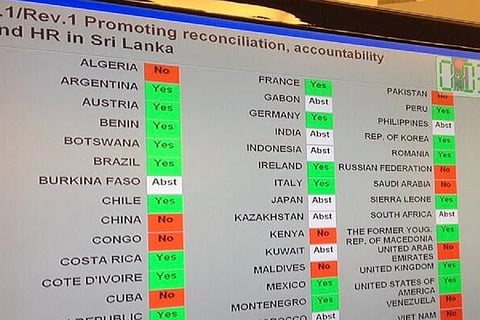

Among the many things diplomats are expected to do is to be economical with the truth as situations demand. Practice has made the task easy as they witness and assist each other in perfecting this poker-like function. Some are more dexterous than others, some use their economic might blatantly while yet others seek comfort in religious groupings. Nobody is dupe – the cynicism is complete.
One such drama is playing out at the European headquarters of the United Nations (UN) in Geneva. At the end of this month countries must take a roll call on what action to take on a report of the Office of the High Commissioner for Human Rights (OHCHR) that details war crimes in Sri Lanka. The OHCHR is seeking an ad-hoc hybrid special court to be established for this purpose. International judges and investigators who can act independently will be part of this court.
The UN’s investigation paints a grim picture of what went on during the final stages of the war between the government and the LTTE or Tamil Tigers in the island nation. The report takes no names but leaves little to the imagination. There is pressure on Sri Lanka to accept the hybrid court and Colombo has pushed back saying it is capable of handling its internal affairs. It has also questioned the findings of the OHCHR. There are murmurs that the United States (US) and the United Kingdom (UK) may not back a meddlesome investigation. They have much to hide as do many others sitting around the table.
The first one to blink loses in poker, the game of cards. Here we are talking about human lives - and thereby hangs the tragedy of what human rights has come to mean in the very organization that had defined it 67 years ago in Paris. Following the death and devastation of the Second World War, the international community put together the Universal declaration of Human Rights (UDHR) in 1948.
This was also the time when colonialism was coming to an end in many countries including India and the drafters and framers of international and national covenants and constitutions held out hope. If a national constitution enshrined a nation’s human rights, the UN was the place where all nations and their people shared mutual concerns and voices.
That power is unfortunately part of folklore now, destroyed by the very people who vouch for it. The list of violations of human rights by countries within and beyond their borders is too long and equally deadly to detail. During the Cold War, there were pet projects with the west criticizing Russia and its allies and Russia volleying back with similar accusations. At the UN whether at the headquarters in New York or in Geneva, it all came down to a macabre game, a play of words and commas, curly brackets and square brackets to get the math right.
Nothing – not the massacre of infants nor the slaughter of the elderly, neither disappearances nor torture and beheadings – now moves the UN to act decisively. In this grotesque game of what and who is more human and more right, smaller nations do worse than larger ones.
Over the next ten days in Geneva, there will be much activity between countries wheeling and dealing about what to do with the latest hot potato on the table. Statements will be issued, civil society will express shock and dismay, journalists will gather for the final vote and the show will move on.
But wait – is that all? No it isn’t. Pressure helps, but putting a country in a pressure cooker typically leads it to vent its anger on innocent civilians. If the framers of UDHR were able to work against all odds to produce a document that spoke to the needs of the day, there is no reason why another piece cannot be added to it to reflect today’s realities. The UN is the only organization we have and our best hope lies in nudging, pushing and dragging it to the drawing board so it returns with something tangible and credible. Human lives are at stake.